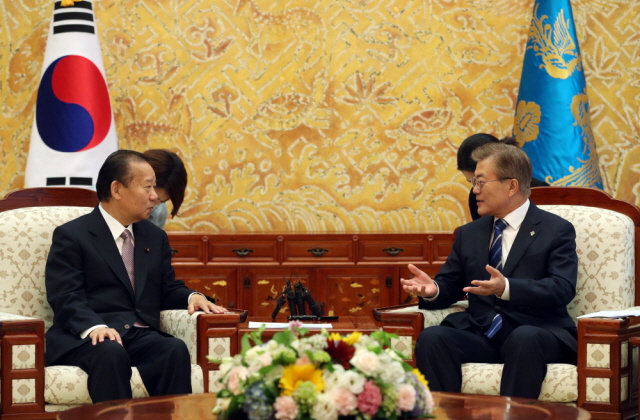이 웹사이트는 제19대 대통령 임기 종료에 따라 대통령기록관이 「대통령기록물 관리에 관한 법률」에 의해 이관받아 서비스하는 대통령기록물입니다. 자료의 열람만 가능하며 수정 · 추가 · 삭제는 불가능합니다.
다만, 「개인정보보호법」에 의하여 개인의 정보를 보호받기 원하시는 분은 관련 내용(요청자, 요청내용, 연락처, 글위치)을 대통령 웹기록물 담당자(044-211-2253)에게 요청해 주시면 신속히 검토하여 조치해 드리겠습니다. 감사합니다.
SPEECHES & REMARKS
BRIEFINGS

President Moon Jae-in met with Japanese Prime Minister Shinzo Abe’s Special Envoy Toshihiro Nikai at the main building of Cheong Wa Dae for an hour from five o’clock this afternoon.
Special Envoy Nikai handed over a personal letter from Prime Minister Abe. After carefully reading the letter, the President asked the Special Envoy to make a point of expressing his appreciation to the Prime Minister for sending a special emissary and a personal letter.
In connection with the denuclearization of North Korea mentioned in the letter, President Moon stressed that it was essential for peace in Northeast Asia and the rest of the world as well as the survival of Korea. He went on to say that Korea and Japan were on the same page in that regard. He added that he could relate to what the Prime Minister said on the necessity of stronger pressure and tougher sanctions for the complete dismantlement of the North Korean nuclear program. He, however, explained that only pressure and sanctions would not be enough to end the situation and that the full disarmament could only be achieved when the North was brought to the negotiating table. On one hand, he added, increased pressure and sanctions should be imposed, but on the other hand, it would be necessary to send a message to the North that the world would be able to help it if it abandoned nuclear weapons. He continued to say that Korea would work closely with the United States and Japan on the unfolding situation involving the North Korean nuclear issue.
Mentioning that the Prime Minster had written about the 2015 agreement over women who were forced into sexual slavery by the Imperial Japanese Army, President Moon noted that the plain reality was that Koreans did not accept the agreement. The President continued to say that, more than anything else, the victims themselves did not accept the deal. In this connection, the President said that both Seoul and Tokyo had to face up to this reality and realize that more time would be needed to deal with this matter.
However, the President said that the two nations should not take the path impeding progress in other areas only by sticking to this matter. He went on to say that both nations needed to pool wisdom to address historical matters, separately from pursuing advancement in other sectors, urging the Special Envoy to convey this message to Prime Minister Abe without fail.
President Moon next said that relations between the two nations were making headway in the face of difficulties, citing the specific example that the number of people traveling back and forth between the two countries exceeded 7 million. Noting that the number was a record high, the President expressed the hope that more Japanese would visit Korea as the number of Koreans traveling to Japan was more than two times that of Japanese coming to Korea.
The President went on to say that the Special Envoy was accompanied by a large number of Japanese tourism industry officials this time, adding that he believed it was going to be very helpful. The President said the two Governments needed to work together so that shuttle diplomacy could eventually be resumed, expressing the hope that civilian exchanges would also be expanded.
President Moon also said he hoped to meet Prime Minister Abe in person at the G20 Summit and have a bilateral summit at the earliest date possible.
Then, the President and the Special Envoy held a long discussion on tourism, including how to encourage Japanese tourists to visit Korea in large numbers for the successful hosting of the PyeongChang 2018 Olympic and Paralympic Winter Games.
Finally, President Moon said what was causing discomfort in and hindering Korea-Japan relations were historical issues, adding that he did not expect that they could be resolved all at once. The President explained that it was crucial for Japan to make efforts to understand the sentiment of the Korean people and that if the two nations gathered their wisdom and improved the situation, bilateral relations would be developed at an even faster pace.
The Special Envoy expressed his understanding, suggesting they work together. Then, the Envoy explained that since the Liberal Democratic Party held a majority in the Japanese Diet, he would make endeavors with a sense of responsibility so that what had been discussed with the President today would be materialized.



